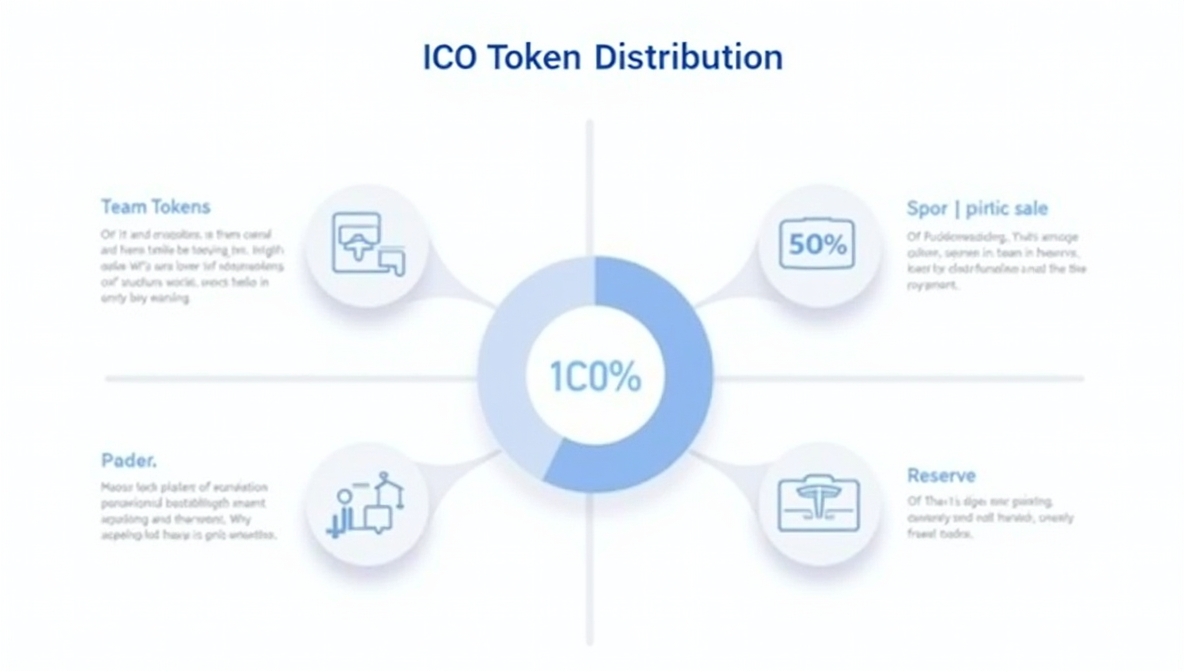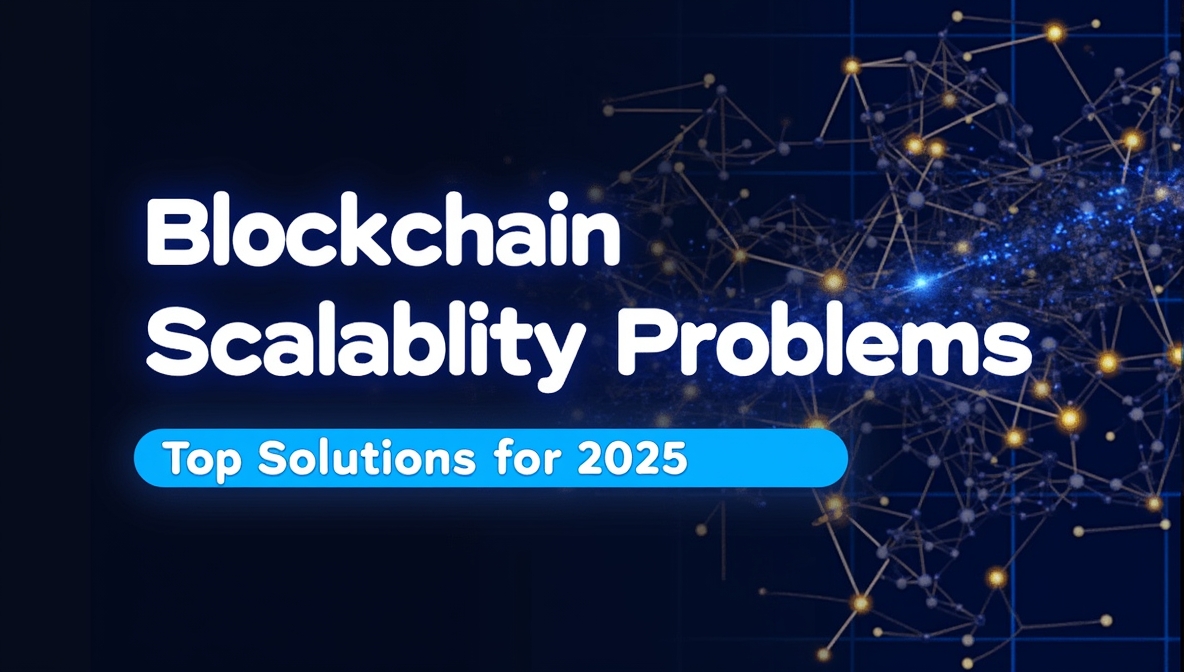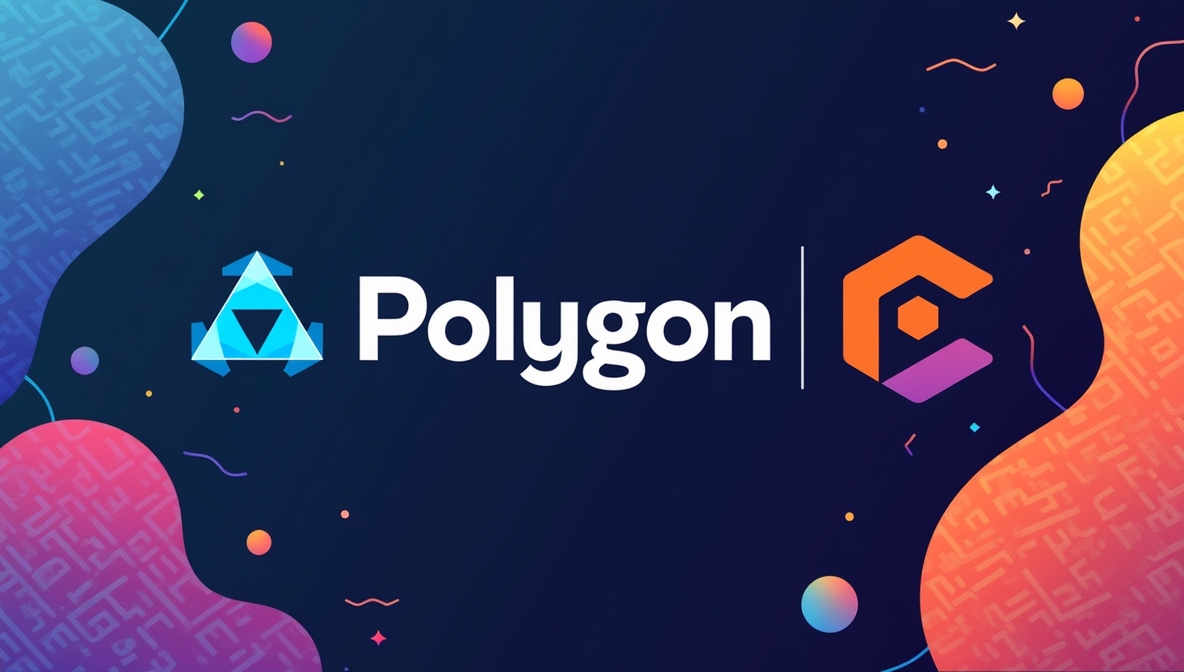Imagine owning a piece of a luxury penthouse in New York, a beachfront villa in Bali, or a commercial complex in Singapore without the traditional hefty price tag. Fractional investment in tokenized real estate makes this possible by using blockchain technology to divide high-value properties into tradable tokens, opening up these lucrative markets to investors of all sizes.
Traditional real estate investment often comes with significant barriers such as high capital requirements and limited liquidity. Fractional ownership addresses these issues by allowing investors to buy shares in properties, thus increasing accessibility and flexibility. This article explores the mechanics, benefits, risks, and applications of tokenized real estate investment, offering insights for both seasoned investors and newcomers. Discover how fractional investment is transforming property ownership and investment opportunities.
Understanding the Concept and Technology
Fractional investment in tokenized real estate assets involves dividing a property’s ownership into digital tokens, each representing a fraction of the property’s total value. This process allows multiple investors to own a share of a single real estate asset, making high-value properties accessible without requiring substantial individual capital. By converting physical real estate into digital tokens, investors can buy, sell, and trade their shares on various platforms, enhancing liquidity and flexibility in the real estate market.
The Growing Trend and Its Significance
The trend of tokenized real estate investment has been accelerating, driven by advancements in blockchain technology and a growing demand for more inclusive investment opportunities. Traditional real estate investment has long been associated with high entry costs, limited liquidity, and geographic constraints. Tokenization addresses these challenges by breaking down properties into smaller, affordable units, allowing a broader range of investors to participate.
According to a 2023 report by Deloitte, the global market for tokenized real estate is projected to grow at a compound annual growth rate (CAGR) of 35% over the next five years, reaching an estimated value of $50 billion by 2028. This surge is fueled by increased investor interest, technological innovations, and the maturation of regulatory frameworks that support digital asset transactions.
Benefits of Tokenization in the Real Estate Landscape
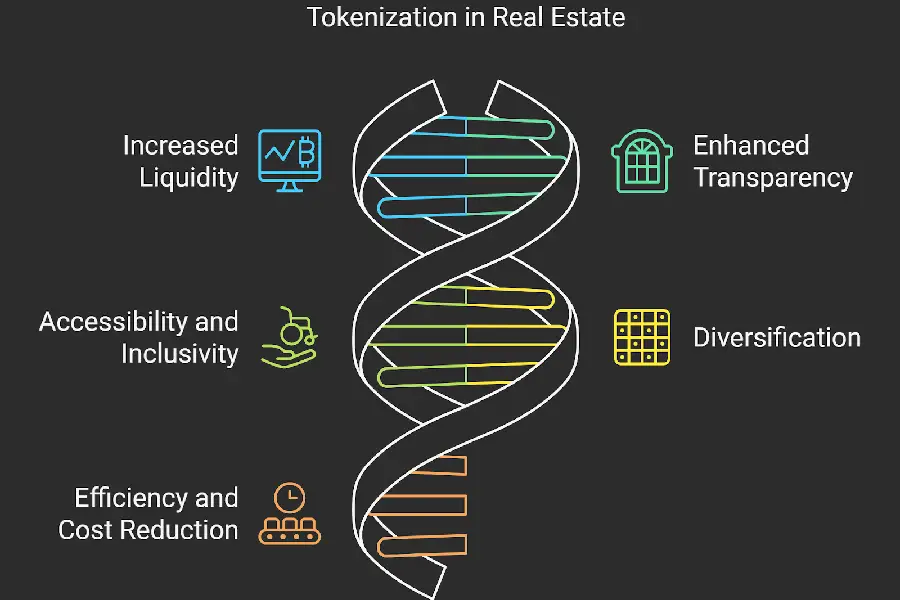
Increased Liquidity: Unlike traditional real estate, which can take months to sell, tokenized assets can be traded swiftly on digital platforms, offering investors the ability to liquidate their holdings quickly and efficiently.
Enhanced Transparency: Blockchain’s transparent ledger ensures that all transactions are visible and verifiable, reducing the chances of fraud and increasing trust among investors.
Accessibility and Inclusivity: Tokenization lowers the barrier to entry by allowing investors to purchase small fractions of high-value properties. This inclusivity opens up investment opportunities to a broader audience, including those who may not have the capital to invest in entire properties.
Diversification: Investors can easily diversify their portfolios by holding tokens from multiple properties across different locations and sectors, spreading risk and enhancing potential returns.
Efficiency and Cost Reduction: By eliminating intermediaries and automating processes through smart contracts, tokenization reduces transaction costs and speeds up the investment process.
In essence, tokenization democratizes real estate investment, making it more accessible, efficient, and secure for a global audience.
Read More: Tokenization in Real Estate: Enhancing Property Buying and Selling
Mechanics of Fractional Ownership
Fractional ownership in tokenized real estate introduces an innovative way to make property investment more accessible and flexible. By dividing ownership of a property into digital tokens, investors can own smaller portions of high-value assets. This process simplifies real estate investment, offering both financial and logistical advantages.
How Fractional Ownership Works in Tokenized Real Estate
The process begins with selecting a property for tokenization, which could be a residential apartment, commercial building, or industrial space. The property is then professionally valued, and its worth is divided into digital tokens. For instance, a $10 million property might be tokenized into 10,000 units, each priced at $1,000.
These tokens are sold through a tokenization platform, where investors can buy as many as they wish. Each token grants its owner a fractional stake in the property, along with the rights to rental income and potential appreciation in value. Unlike traditional real estate investments, tokenized assets offer liquidity, as investors can trade their tokens on secondary markets at their convenience.
In 2018, a luxury condominium complex at 436 and 442 East 13th Street in Manhattan’s East Village was tokenized on the Ethereum blockchain. This development, valued at $30 million, comprised 12 units, each approximately 1,700 square feet. The tokenization allowed investors to purchase fractional shares of the property, democratizing access to high-value real estate assets.
Platforms like RealT and SolidBlock are at the forefront of this innovative model. RealT offers fractional ownership of U.S. real estate properties through Ethereum-based tokens, enabling global investors to earn passive income secured by blockchain technology.
SolidBlock gained recognition for tokenizing the St. Regis Aspen Resort, raising $18 million in four months, and exemplifying the potential of tokenized commercial real estate.
These examples highlight the scalability and democratizing potential of real estate tokenization, making property investment more accessible to a broader audience.
The Process of Purchasing and Holding Real Estate Tokens
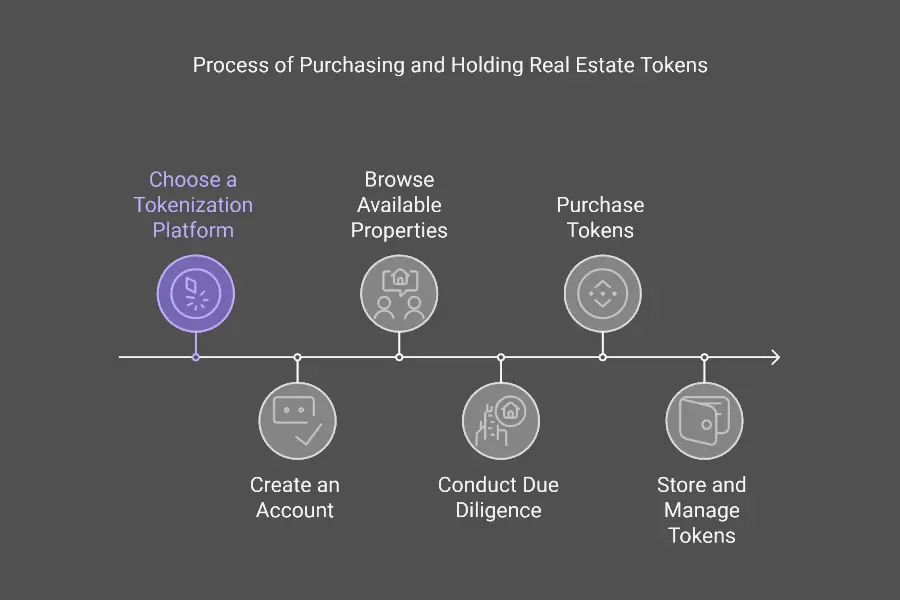
Investing in tokenized real estate assets is a streamlined process that typically involves the following steps:
- Choose a Tokenization Platform: Select a reputable and regulated platform that specializes in real estate tokenization. Platforms like Tokenova, RealtyBits, and Brickblock are popular choices.
- Create an Account: Register on the platform by providing the necessary information and completing any required verification processes, such as Know Your Customer (KYC) and Anti-Money Laundering (AML) checks.
- Browse Available Properties: Explore the platform’s listings to find properties that match your investment goals. You can filter by location, property type, expected returns, and other criteria.
- Conduct Due Diligence: Review detailed information about the property, including financials, market analysis, legal documentation, and third-party evaluations. This step is crucial to ensure the investment aligns with your risk tolerance and objectives.
- Purchase Tokens: Decide on the number of tokens you wish to purchase and complete the transaction using supported payment methods, which may include fiat currency, cryptocurrencies, or stablecoins.
- Store and Manage Tokens: After purchasing, your tokens are stored in a digital wallet provided by the platform. You can monitor your investment, track performance, and manage your portfolio directly through the platform’s interface.
These streamlined steps make it easier for investors to access fractional real estate opportunities and diversify their portfolios.
Role of Smart Contracts in Managing Fractional Ownership
Smart contracts play a pivotal role in the management of fractional ownership in real estate by automating and securing various aspects of the investment process. Here’s how they function:
Automated Income Distribution: Smart contracts can automatically distribute rental income or other earnings to token holders based on their ownership percentage. This eliminates the need for manual calculations and ensures timely payments.
Compliance and Regulation: Smart contracts can enforce compliance with relevant regulations by embedding legal requirements into the code. This ensures that all transactions and ownership transfers adhere to legal standards without the need for external oversight.
Transaction Integrity: Every transfer of tokens is recorded on the blockchain, ensuring that ownership changes are transparent, irreversible, and tamper-proof. This enhances trust and reduces the risk of disputes.
Governance and Decision-Making: Smart contracts can facilitate decentralized governance by enabling token holders to vote on important decisions related to the property, such as maintenance, renovations, or changes in management. This democratizes the decision-making process and aligns the interests of all investors.
Security and Trust: By eliminating intermediaries and automating processes, smart contracts reduce the potential for human error and fraud, providing a secure environment for investors to manage their assets.
Smart contracts enhance the efficiency, security, and transparency of tokenized real estate investments, making fractional ownership a reliable and attractive option for investors.
Advantages of Fractional Investment in Tokenized Real Estate
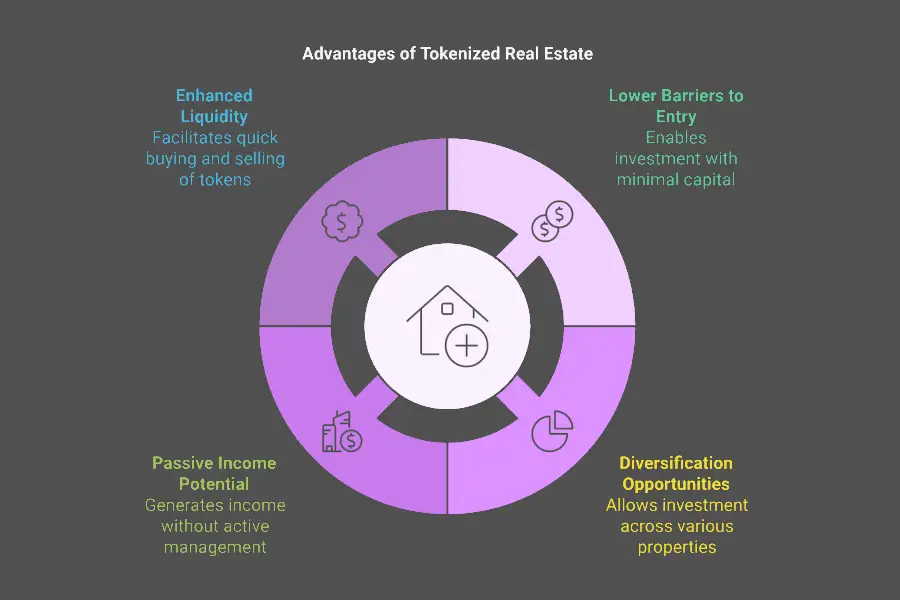
Fractional investment in tokenized real estate has revolutionized property ownership, offering flexibility and accessibility to a wider range of investors. Here’s a look at its key advantages:
- Lower Barriers to Entry for Investors
One of the most significant advantages of fractional investment in tokenized real estate assets is the dramatically reduced barrier to entry. Traditional real estate investment typically requires substantial capital often in the range of hundreds of thousands to millions of dollars to purchase entire properties or significant shares. This exclusivity limits participation to wealthy individuals or large institutional investors.
Read More: Fractional Ownership Tokenization: Unlocking Wealth and Its Power
Tokenization changes the game by allowing properties to be divided into thousands of affordable tokens. Investors can start with as little as a few hundred dollars, making real estate investment accessible to a much broader audience. This inclusivity not only democratizes property ownership but also enables a more diverse pool of investors to benefit from real estate’s potential returns.
- Diversification Opportunities Across Multiple Properties
Diversification is a cornerstone of a resilient investment portfolio, and fractional ownership in real estate excels in this area. Instead of committing a large sum of money to a single property, investors can spread their capital across multiple tokenized assets in different locations and sectors. This diversification mitigates risk by reducing exposure to any single market or property type.
For example, an investor might hold tokens in residential properties in New York, commercial buildings in London, and vacation rentals in Bali. This geographical and sectoral diversification ensures that the performance of one asset does not disproportionately impact the overall portfolio, enhancing stability and potential returns over time.
- Potential for Passive Income Through Rental Yields
Tokenized real estate investment offers the enticing possibility of generating passive income. When a tokenized property generates rental income, it is distributed automatically to token holders in proportion to their ownership stakes. This means investors can earn regular income without the need to manage tenants, handle maintenance, or deal with other operational aspects of property management.
This streamlined income distribution is facilitated by smart contracts, which ensure that payments are made promptly and accurately. For investors seeking steady, reliable returns, the passive income generated by tokenized real estate can be an attractive addition to their overall investment strategy.
- Enhanced Liquidity Compared to Traditional Real Estate Investments
Liquidity has long been a challenge in the real estate market, where buying or selling properties can take months and involve significant transaction costs. Fractional ownership in real estate via tokenization addresses this issue by providing a more liquid investment vehicle. Tokens can be bought and sold on secondary markets with relative ease, allowing investors to quickly adjust their holdings in response to market conditions or personal financial needs.
This enhanced liquidity not only provides greater flexibility but also makes real estate investment more appealing to those who may need to access their funds on short notice. By facilitating faster and more efficient transactions, tokenization makes real estate a more dynamic and adaptable component of an investment portfolio.
Additional Benefits
Beyond the primary advantages, tokenized real estate offers several other compelling benefits:
✅Transparency and Trust: Blockchain’s immutable ledger ensures that all transactions are transparent and verifiable, fostering trust among investors.
✅Cost Efficiency: Reduced need for intermediaries and streamlined processes lower transaction costs, making investments more cost-effective.
✅Global Access: Investors from around the world can participate in real estate markets that were previously inaccessible due to geographic and regulatory barriers.
✅Fractional Voting Rights: Some platforms offer token holders the ability to vote on property-related decisions, enhancing investor engagement and governance.
Overall, fractional investment in tokenized real estate assets provides a host of advantages that make it an attractive option for modern investors seeking flexibility, diversification, and enhanced returns.
Risks and Challenges
Tokenized real estate presents unique opportunities but comes with various risks that investors need to consider.
Regulatory Uncertainties: The regulatory landscape for tokenized real estate varies by jurisdiction, affecting securities, property rights, and taxation. Investors must stay informed about regulations in both their home country and where the property is located to avoid legal issues and potential investment loss.
Market Volatility: While real estate is often viewed as stable, tokenized assets can experience significant price fluctuations due to local economic conditions or broader market changes. Investors should exercise caution, performing due diligence on the property and market conditions.
Technological Risks: Blockchain technology, while robust, can face technical issues. Risks include smart contract vulnerabilities, platform downtimes, and cyberattacks. It’s crucial for investors to evaluate the security and track record of tokenization platforms.
Due Diligence: Investors must conduct thorough due diligence on the real estate assets. This includes assessing the property’s condition, performing financial analyses, verifying legal title, and evaluating the credibility and security of the tokenization platform. Insufficient due diligence can lead to significant financial risks.
Current Market Landscape
The tokenized real estate market is rapidly gaining traction, with platforms emerging to meet the growing demand for fractional property ownership. These platforms provide diverse investment opportunities, leveraging blockchain technology to enhance accessibility, transparency, and security.
Overview of Platforms Offering Tokenized Real Estate Investments
The market for tokenized real estate investment is rapidly expanding, with numerous platforms emerging to cater to investor demand. These platforms vary in their offerings, focus areas, and operational models, providing a wide range of options for investors. Here are some notable platforms:
- Tokenova: A leading platform specializing in high-quality, vetted properties across global markets. Tokenova offers a user-friendly interface, secure transactions, and comprehensive support for investors.
- RealtyBits: Focused on commercial real estate, RealtyBits provides access to office buildings, retail spaces, and industrial properties. The platform emphasizes transparency and robust financial analysis.
- Brickblock: Offering a diverse portfolio of residential and commercial properties, Brickblock integrates advanced blockchain technology to ensure seamless investment processes and enhanced security.
- Harbor: A pioneer in tokenized securities, Harbor provides a range of real estate investment opportunities with a focus on compliance and regulatory adherence.
- Smartlands: Catering to both institutional and individual investors, Smartlands offers a curated selection of tokenized real estate assets, along with detailed market insights and performance tracking tools.
These platforms serve as gateways for investors to access tokenized real estate assets, each with its unique strengths and specialties. When selecting a platform, investors should consider factors such as security, regulatory compliance, property selection, user experience, and fee structures.
Real Examples and Case Studies Illustrating the Potential
To understand the tangible impact of fractional ownership in real estate, consider notable examples that demonstrate its effectiveness:
AspenCoin and the St. Regis Aspen Resort
In 2018, Aspen Digital Inc. tokenized the St. Regis Aspen Resort, enabling accredited investors to purchase fractional shares via AspenCoin tokens. This initiative raised $18 million, showcasing the democratization of high-end property investment. Investors earned a share of rental income and potential appreciation, with all transactions secured via blockchain.
Red Swan and Commercial Real Estate Tokenization
Red Swan partnered with blockchain technology to tokenize a $2.2 billion commercial real estate portfolio (accesswire). In 2020, the platform raised $4 million through its marketplace, highlighting the scalability of tokenized investments and their appeal to global investors.
Smartlands and Student Accommodation in London
Smartlands launched a tokenized offering for a student accommodation property in London, attracting investors with detailed financial projections and legal transparency. This project demonstrated tokenization’s ability to cater to niche, income-generating assets.
These examples underscore the practicality and global reach of tokenized real estate investment. Platforms that provide evidence-based case studies, transparent documentation, and thorough property assessments are more likely to earn investor confidence and rank highly in search engine results due to their authoritative and trustworthy content.
Emerging Trends and Future Outlook in the Industry
The tokenized real estate investment landscape is continuously evolving, with several emerging trends shaping its future:
Institutional Adoption: As regulatory frameworks become clearer, more institutional investors are entering the tokenized real estate market. This influx of capital and expertise is driving innovation, enhancing market stability, and expanding the range of available investment opportunities.
Integration with DeFi: The integration of decentralized finance (DeFi) protocols with tokenized real estate platforms is creating new financial products and services, such as real estate-backed loans, staking, and yield farming, providing investors with additional ways to leverage their investments.
Enhanced User Experience: Platforms are focusing on improving user interfaces, simplifying the investment process, and offering comprehensive support to attract a wider audience of retail investors.
Sustainability and Green Building Initiatives: Tokenized real estate projects are increasingly emphasizing sustainable and eco-friendly building practices, aligning with global trends towards environmental responsibility and attracting socially conscious investors.
Global Expansion: As tokenization gains acceptance, platforms are expanding their reach to include properties in emerging markets, providing investors with access to high-growth regions and diverse real estate opportunities.
AI and Data Analytics: Leveraging artificial intelligence and advanced data analytics to evaluate property performance, predict market trends, and personalize investment recommendations, enhancing decision-making for investors.
Fractional REITs: The emergence of Real Estate Investment Trusts (REITs) in tokenized form, allowing investors to buy shares in diversified property portfolios, similar to traditional REITs but with enhanced liquidity and accessibility.
The future outlook for fractional ownership in real estate is highly optimistic, with anticipated growth driven by technological advancements, increased investor interest, and the continuous refinement of regulatory standards. As the market matures, tokenized real estate is expected to become a staple in global investment portfolios, offering unparalleled flexibility, accessibility, and potential for returns.
How to Get Started with Fractional Investment in Tokenized Real Estate
Fractional investment in tokenized real estate is an accessible and flexible way to enter the property market. Following a structured approach can help you make informed decisions and maximize your returns.

Steps to Begin Investing in Tokenized Real Estate
Embarking on a journey into tokenized real estate investment requires careful planning and informed decision-making. Here are the essential steps to get started:
- Set Clear Investment Goals: Determine your objectives whether you seek passive income, capital appreciation, diversification, or long-term stability. Clear goals will guide your investment strategy and property selection.
- Research Tokenization Platforms: Evaluate various platforms based on their security measures, regulatory compliance, property offerings, user interface, fees, and reputation. Platforms like Tokenova, RealtyBits, and Brickblock are excellent starting points.
- Create and Verify Your Account: Register on your chosen platform by providing the necessary personal information and completing verification processes, including KYC and AML checks.
- Explore Available Properties: Browse the platform’s listings to identify properties that align with your investment goals. Consider factors such as location, property type, expected returns, and market conditions.
- Conduct Due Diligence: Perform thorough research on the selected properties. Review financial reports, market analyses, legal documents, and third-party assessments to ensure the investment is sound.
- Purchase Tokens: Decide on the number of tokens you wish to purchase based on your budget and investment strategy. Complete the transaction using the platform’s supported payment methods, which may include fiat currency, cryptocurrencies, or stablecoins.
- Secure Your Tokens: Once purchased, your tokens will be stored in a digital wallet provided by the platform. Ensure your wallet is secure, and consider using hardware wallets for added protection.
- Monitor and Manage Your Investment: Regularly review your investment’s performance through the platform’s dashboard. Stay informed about property updates, market trends, and any changes that may impact your investment.
- Plan for Exit Strategies: Understand the platform’s policies on selling tokens and explore secondary markets where you can trade your tokens if you wish to liquidate your investment.
Why Choose Tokenova?
After following these steps, you’ll realize the importance of a reliable, user-friendly platform. Tokenova stands out as a trusted partner in the world of tokenized real estate investments. With a commitment to transparency, security, and simplicity, Tokenova provides:
✅A diverse portfolio of vetted properties worldwide.
✅An intuitive interface that makes investing easy, even for beginners.
✅Advanced security measures to protect your assets and personal data.
✅Comprehensive property information, enabling informed decision-making.
Take the next step in your investment journey and experience the benefits of tokenized real estate with confidence. Contact Tokenova today for a consultation and discover how fractional ownership in real estate can work for you. Your future starts now.
Criteria for Selecting Reliable Platforms and Properties
When selecting a tokenization platform and properties to invest in, consider the following criteria:
Platform Reputation and Security: Choose platforms with a proven track record, strong security measures, and positive user reviews. Look for platforms that undergo regular security audits and have robust data protection protocols.
Regulatory Compliance: Ensure the platform complies with relevant regulations in your jurisdiction and the property’s location. This includes adherence to securities laws, property rights, and tax regulations.
Property Quality and Location: Invest in properties located in high-demand areas with strong economic fundamentals. Assess the property’s condition, market potential, and historical performance to gauge its investment viability.
Transparency and Information Availability: Reliable platforms provide comprehensive information about each property, including financials, legal documentation, market analysis, and third-party evaluations. Transparency is crucial for informed decision-making.
Fee Structure: Understand the platform’s fee structure, including transaction fees, management fees, and any other costs associated with buying, selling, and holding tokens. Competitive and transparent fees enhance overall investment returns.
User Experience and Support: A user-friendly interface and responsive customer support are essential for a seamless investment experience. Platforms that offer educational resources, tutorials, and dedicated support can help investors navigate the tokenization process more effectively.
Understanding Legal and Tax Implications
Investing in tokenized real estate assets involves various legal and tax considerations that investors must understand to ensure compliance and optimize their financial outcomes:
Legal Ownership Rights: Understand what ownership rights each token confers. This includes rights to rental income, property appreciation, and voting on property-related decisions. Legal ownership structures can vary, so it’s essential to know your rights as a token holder.
Taxation of Income and Capital Gains: Rental income received from tokenized real estate may be subject to income tax, and any profits from selling tokens could incur capital gains tax. Tax regulations differ by country, so consulting with a tax professional is advisable to understand your obligations.
Regulatory Requirements: Different jurisdictions have specific laws governing securities, property ownership, and digital assets. Ensure that your investments comply with both local and international regulations to avoid legal issues.
Reporting and Documentation: Maintain accurate records of all transactions, income received, and taxes paid. Proper documentation is crucial for tax reporting and in the event of an audit.
Estate Planning: Consider how tokenized real estate assets fit into your overall estate plan. Ensure that your investment portfolio is structured to facilitate smooth transfer of assets to heirs or beneficiaries.
By thoroughly understanding the legal and tax implications, investors can make informed decisions, optimize their returns, and ensure compliance with all relevant regulations.
Tokenova: Your Partner in Tokenized Real Estate Investment
Tokenova is your gateway to seamless and secure fractional investment in tokenized real estate assets. Designed with both new and experienced investors in mind, Tokenova simplifies the investment process while offering access to premium global properties.
Why Choose Tokenova?
- Comprehensive Property Listings: Access a diverse portfolio of vetted residential and commercial properties worldwide.
- Advanced Security: State-of-the-art blockchain technology ensures your investments are safe and transparent.
- Streamlined Process: From property selection to token purchase and income distribution, Tokenova handles the heavy lifting so you can focus on growing your portfolio.
- Expert Support: Receive insights and guidance from Tokenova’s real estate and blockchain specialists.
Ready to redefine your real estate investment experience? Join Tokenova today and explore how fractional ownership can work for you.
Insider Edge: Advanced Strategies for Maximizing Your Investment
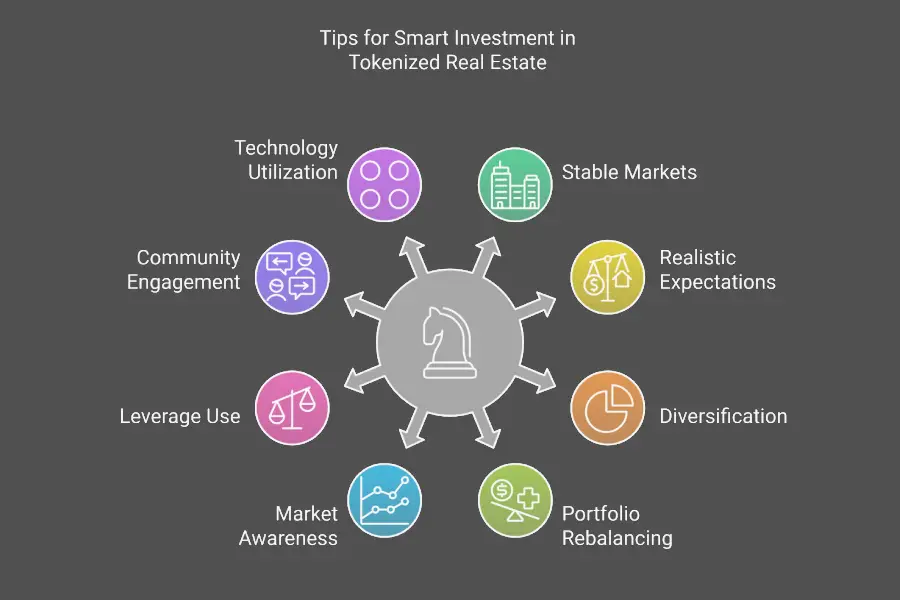
To truly excel in the realm of tokenized real estate investment, leveraging advanced strategies can significantly enhance your returns and mitigate risks. Here are some insider strategies to help you maximize your investment:
Read More: How to Invest in Tokenized Assets?
Focus on Stable Markets First
When starting with fractional ownership in real estate, it’s prudent to begin with properties located in established, stable markets. Cities with robust economic fundamentals, strong rental demand, and consistent property appreciation are ideal choices. Investing in well-established markets like New York, London, or Singapore can provide a solid foundation, offering more predictable returns and lower volatility compared to emerging or speculative markets.
Set Realistic Return Expectations
While the allure of high returns is tempting, it’s essential to set realistic expectations for your tokenized real estate investments. Focus on properties with proven rental yields and potential for steady appreciation rather than chasing sky-high returns that may come with increased risk. Steady, moderate returns compound over time, contributing to long-term wealth accumulation without exposing your portfolio to excessive risk.
Diversify Across Property Types and Locations
Diversification remains a key strategy in managing risk and enhancing returns. Spread your investments across different property types residential, commercial, industrial and various geographic locations. This approach ensures that your portfolio is not overly reliant on the performance of a single property or market, thereby reducing exposure to localized economic downturns or sector-specific challenges.
Rebalance Your Portfolio Periodically
Regularly reviewing and rebalancing your investment portfolio is crucial for maintaining alignment with your financial goals and market conditions. As the real estate market evolves, certain properties may outperform or underperform, altering the overall balance of your portfolio. Rebalancing allows you to adjust your holdings, take profits from high-performing assets, and reinvest in underrepresented areas to optimize your portfolio’s performance.
Stay Informed About Market Trends and Regulatory Changes
The tokenized real estate investment landscape is dynamic, with ongoing advancements in technology, shifts in market trends, and evolving regulatory frameworks. Staying informed about these changes is essential for making proactive investment decisions. Subscribe to industry newsletters, follow real estate and blockchain news, attend webinars, and engage with professional networks to keep abreast of the latest developments and adjust your investment strategy accordingly.
Utilize Leverage Wisely
While leveraging using borrowed capital to increase the potential return of an investment can amplify gains, it also increases risk. In the context of fractional real estate tokens, some platforms may offer options to use tokens as collateral for loans or to participate in more significant investment opportunities. Use leverage judiciously, ensuring that you fully understand the associated risks and have a clear plan for managing potential downsides.
Engage with the Community
Participating in the Tokenova community and other tokenized real estate forums can provide valuable insights, tips, and support from fellow investors. Sharing experiences, asking questions, and collaborating on strategies can enhance your understanding and help you make more informed investment decisions. Additionally, engaging with the community can keep you motivated and connected to the broader investment landscape.
Leverage Technology and Analytics
Utilize the analytical tools and resources provided by your tokenization platform to make data-driven investment decisions. Platforms like Tokenova often offer performance dashboards, market analysis reports, and forecasting tools that can help you assess the potential of different properties and track your investment’s performance over time. Embracing technology ensures that your investment strategy is informed by accurate, real-time data.
Conclusion
Fractional investment in tokenized real estate is reshaping property investment, making it more accessible, liquid, and transparent. By utilizing blockchain and smart contracts, tokenization opens up opportunities for a wider range of investors, moving beyond just the affluent and institutional players.
This approach offers benefits like lower entry barriers, enhanced diversification, passive income, and improved liquidity. However, challenges such as regulatory uncertainties and market volatility remain. With thorough due diligence and reputable platforms like Tokenova, investors can successfully navigate these issues.
As tokenization grows, fractional ownership is expected to become a staple in global investing. Now is an ideal time to explore this innovative investment method and build a robust portfolio in the dynamic real estate market.
Key Takeaways
- Tokenization Explained: Tokenization converts real estate into digital tokens on a blockchain, enabling fractional ownership and making property investment more accessible.
- Global Accessibility: Investors worldwide can access high-value properties with smaller capital investments, breaking down traditional barriers to entry.
- Advantages: Fractional investment reduces entry costs, enhances portfolio diversification, provides passive income through rental yields, and offers greater liquidity compared to traditional real estate investments.
- Risks: Investors must navigate regulatory uncertainties, market volatility, and technological risks. Conducting thorough due diligence is essential.
- Tokenova’s Role: Tokenova simplifies fractional ownership in real estate, offering secure transactions, expert guidance, and a diverse range of vetted properties, making it an ideal partner for investors.
References: +



